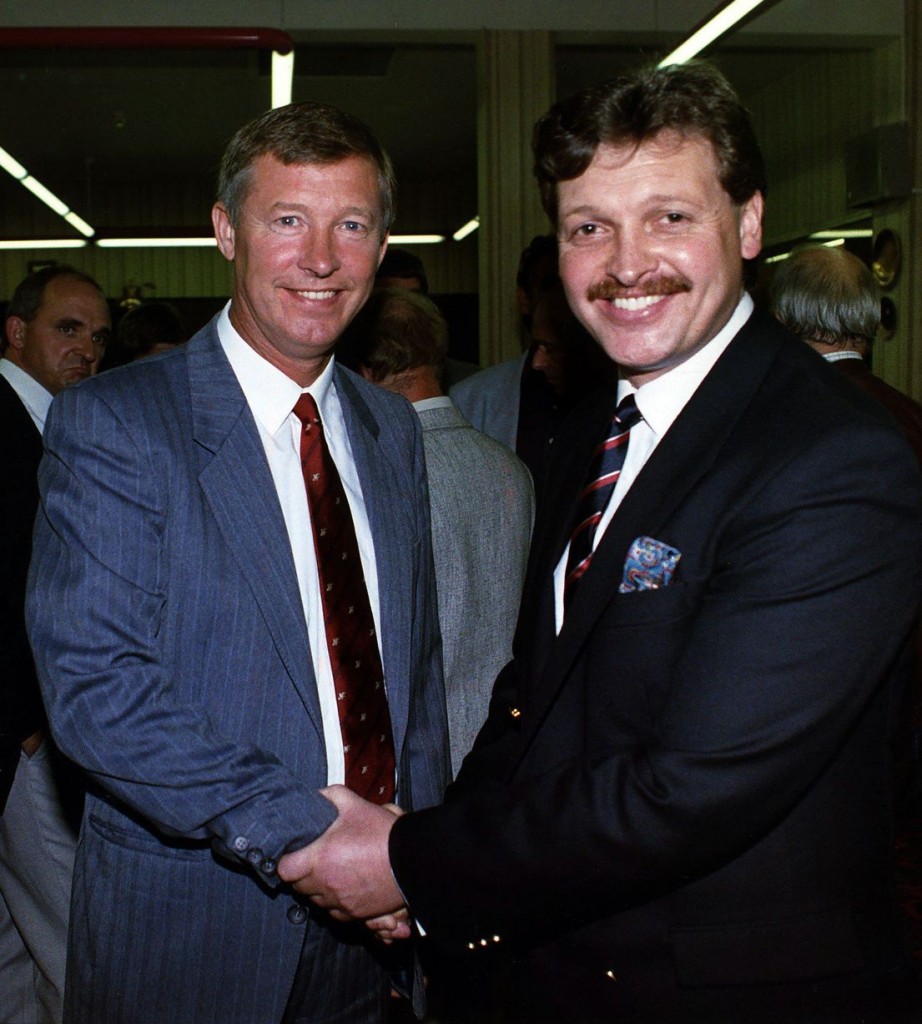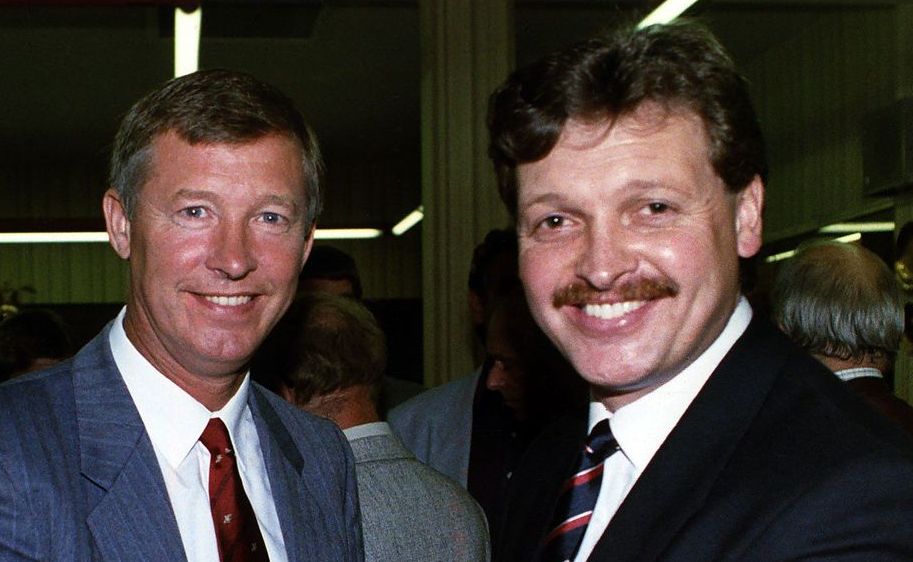A Rebirth: Happy days with the great man – oh yes – there really is only one Sir Alex Ferguson
 With Manchester United currently experiencing their most disappointing season for more than twenty four years – many people are asking me what’s gone wrong at Old Trafford? And, almost inevitably, straight on the back of that question comes – and what is Sir Alex Ferguson really like to work with?
With Manchester United currently experiencing their most disappointing season for more than twenty four years – many people are asking me what’s gone wrong at Old Trafford? And, almost inevitably, straight on the back of that question comes – and what is Sir Alex Ferguson really like to work with?
I had the privilege to work with Sir Alex for three years from 1989 – 1992. I was there right at the very beginning of a new dawn at the club. A rebirth in which, so some writers claim, in my giving the club a radical blueprint for the commercial development of Manchester United, in a manner of speaking, I was perhaps the midwife that ensured a safe delivery into a world which led to the club pursuing a pathway to pure naked commercialism. A commercialism that brought the club untold riches and wealth. A journey which ultimately led to the club arriving at a point whereby the name, Manchester United, had morphed into becoming perhaps the greatest sporting brand on the planet. A fascinating hypothesis to say the least.
It is certainly the case that 1989 was the very year that undoubtedly saw the rebirth of the club. An epiphany that witnessed the club saying goodbye to previous decades of commercial stagnation and disappointing performances on the pitch. A new dawn had broken through together with a fluke unplanned real, yet unreal ‘partnership’ of two football men who together, and in their completely different ways – heralded in a stupendous blazing sunrise that would bring to the club a twenty-five year period of stunning, unimagined, glittering success both on and off the field. I am very proud to say that I played my full part in that momentous rebirth of Manchester United. And, believe it or not – not even the most fiercest, ferocious critics of mine would deny me that small claim to fame.
But what’s happened to the club now? Everyone seems pretty stunned at the dramatic and sudden collapse of the playing performance side at the club. MU had built a guaranteed, seemingly impregnable fortress at Old Trafford. A venue that would more often than not lead to automatic success and victory for the Home team. Or, so it seemed until this season. When, with a new man at the helm of the playing side of the club – even the least likely of opponents have been seen to take points home from Old Trafford. How come? What’s gone wrong? This is the burning question that everyone appears to be screaming at those they expect to know the answers.
What is to become of the club now they ask? Now that the great man is no longer at the helm of the playing side? Is Manchester United doomed to return to the underperforming, stagnating days of old? Of course, any observer can be forgiven for thinking that things will and can never quite be the same again as they were under Sir Alex Ferguson. And they are right. That judgement is perfectly correct. The simple fact of the matter is how could things ever be the same once the great man had decided that it was time to hang up his tracksuit and put away the infamous ‘hairdryer’ for good. No, nothing would or could ever be the same again after that.
David Moyes could never be Alex Ferguson. These two men are very different characters. Very different indeed. And, whilst this appears to be an obvious point to make – it is not just a matter of stating the obvious – the answers are not as simple as they may first appear. The factors are, in fact, very complex. Certainly, there is and can only ever be – one Alex Ferguson.
But people would be foolish to write off David Moyes as a failure and a character that is not the right man for the job at this early stage into his Old Trafford career. No, the new manager should certainly not be written off – well not just yet at least. He should not be consigned to the dustbin as being yet another one of those characters’ that – whilst being very good – could just not hack it at the great Manchester United. But there will be those who will already be asking that very question of David Moyes. Is he yet another man who has enjoyed success elsewhere, but on arriving at Old Trafford, he is another man who has found that this great theatre of dreams – the one and only Old Trafford – is already proving to be just too big a job for him ? A place that he might never be able to repeat that previous success that he has enjoyed elsewhere? That is a fair question, and, as always, only time will give us the answer.
For me, in many ways, on the surface at least this man David Moyes was the perfect replacement for Alex Ferguson. I say this because I know from my personal experience of David Moyes that his strength of character is excellent. He knows the game inside out and he knows players. His football work ethic is nothing short of outstanding – it being very Fergusonesque in that sense. So, I advise the overly concerned about his appointment that we should all wait a while before we all go demanding that his head roll down the players’ tunnel and out the Old Trafford door in the usual unceremonious manner that a managers’ head rolls when things are not going well on the pitch.
I joined the Manchester United board of directors on 25th October 1989. It’s fair to say that at that time things were not going too well for Sir Alex. The team were struggling on the pitch and things were looking very grim indeed. To boot – we had the frantic hype and the all too often-negative press that became more than manic in some quarters of the press surrounding my own take-over bid to buy the club in that hot summer of 1989. A bid that I eventually agreed to abort for a seat on the club’s board of directors, together with the club agreeing to provide me with the platform and the opportunity to see my football blueprint for the commercial development of Manchester United put into full operation. But, the results on the pitch were pretty dire in that early part of the 1989-1990 season. Indeed, many fans and certainly some sections of the press, were calling for Alex Ferguson to be sacked. That reaction is par for the course in this real yet often unreal world of professional football. It’s not a game for the faint hearted.
And, when I joined the club – I remember the fans chanting “Fergi Out, Fergi Out.” A vicious, very vocal chant that would ring around the ground virtually from the kick-off of each game on match days. There were also massive banners draped around the Old Trafford stadium howling the fans discontent and screaming the words – “Three years of excuses and it’s still crap – ta-ra Fergie.” etc., etc. You know the stuff. You’ve seen it all before at every football ground in the land. This type of experience and fan reaction, from a certain type of football fan, ‘twas and is ever thus when things are not going well on the pitch at their club.
Such times at any football club can be very testing for everyone involved in the management and operation of the organisation. Even Sir Alex Ferguson himself has described that time back in 1989 as…“ the darkest period (he had) ever suffered in the game “. So you see – people forget – it was not always a bed of roses at Old Trafford even for the great Sir Alex Ferguson.
But what those fans and journalists that were calling for Alex to be sacked back in 1989 didn’t know – was that Alex was rebuilding the club’s playing side from top to bottom including the school, youth and scouting system. It was a long-term plan. All Alex needed was the time and the money to carry out his plan. A thoughtful and measured boardroom granted that time. And, of course, as we all now know – the cash streams – the barrow loads of money came rolling in like the riches of avarice had suddenly befallen the club. These two critical factors changed the tide in Alex Ferguson’s favour. Certainly, virtually every clever MU analyst now agrees that, in no small measure, that opportune and very timely cash-splurge at the club fired the engines that were to power the club forward and allow Alex Ferguson to achieve his dream of winning a major trophy every year. A fabulous golden period that would see the club go on to win 38 trophies, including 13 Premier League titles, five FA Cups and two UEFA Champions League titles during Alex Ferguson’s time as team manager – a period that will probably never be equalled again I dare say.
In my time as a director at the club I saw the club utterly transformed both on and off the pitch. I was there when we won the FA Cup, the League Cup, the European Cup Winners, the European Super Cup, the Charity Shield, the FA Youth Cup and we just missed out on winning the domestic league title for the first time in 28 years by coming second in season 1991-92. That is football success of the very first magnitude and by any measure one cares to judge. Off the pitch the club had been transformed into a money making machine. A machine that simply could not stop itself from raining money – money that went straight into the coffers of Alex Ferguson so that he had the buying power to go out and buy any star player in the world should he so choose. That is exactly what happened in my time at Old Trafford and those facts are the absolute, undeniable truth of the situation. It matters not to me what any one else claims or says – that is the truth of the reality as I experienced it first hand.
And, what is more, I just knew that that particular train ride of mega success at Manchester United would not stop for a very long time to come – perhaps even for the next quarter of a century – which is exactly what has happened. And, in part, that’s why I decided, to the shock of my boardroom colleagues, to swiftly jump off the train at the platform marked Carlisle United FC. I jumped off that train at the end of the 1992 season. I reasoned that it was time to bring an end to my time at Old Trafford. I had seen the club achieve what I knew it was always capable of achieving and I was very confident that that blistering success both on and off the pitch would continue – so I moved on. I moved on to begin my time at Brunton Park – the then decaying home of rock bottom club, Carlisle United FC. And, this proved to be a very different train ride. Indeed, this proved to be roller-coster ride which would see brilliant highs and equally dramatic and testing lows , but, nevertheless, it was still a football journey that I wouldn’t have missed for the world.
Ah, Carlisle. A lovely city in the far north of our country. Very nice, good and honest people. And, with the added bonus of having a perfect little football club to boot. Even if it was a football club at that time which sat right at the bottom of all the professional football Leagues in 1992. A club that was then currently propping up the entire 92 professional League clubs but it was a club whereby I thought that potentially it had so much going for it and I just loved it. The prospect of the challenge of it all was too much to resist. And, as any one who knew a small chubby bloke with a moustache, they will tell you this – that this small tubby bloke – he simply can’t resist a challenge. And Carlisle was certainly some challenge.
My time in that part of the world gave me some of my happiest and saddest times in football. But, hey, you have to taste the honey and be ready for the vinegar that is almost bound to follow in this game – if you are to survive in the game – and that’s just what football is all about – is it not? I certainly enjoyed barrel loads of honey in the early years at Carlisle with Championships, Promotion play-offs, record transfer fees paid and received, excitement beyond anyone’s wildest football dreams complete with two absolutely momentous Wembley Cup Final visits one with the famous ‘Deckchair’ strip. It was all just so thrilling for everyone involved during the honey drenched days.
But that stupendous success was equally matched by the disappointments that came with vat loads of vinegar. The Relegations, the great escapes, and, finally, my procrastinated departure as owner of the club. I’m afraid, regrettably, these events saw it all end in bitterness and acrimony on all sides and rather soured the early success that we had all enjoyed and shared so readily. But, hey, that’s just the way it can so often be in this wonderfully bizarre game of football. For myself, I now remember only the great times at Carlisle together with the many good people and the solid friendships that were formed. They are far more important to me than my spat with the local press and the bitter and twisted trolls that still remain apparently haunted by the ghost of one Michael Knighton. The trolls – as we all know – are noting but a vicious group of sad individuals who are incapable of moving on from their warped version of events that surrounded those exciting and hectic times.
People often ask me what it was like to be involved as a club director in the professional football industry at both ends of the football spectrum ? First, at the very top of the sport as a director at the greatest football club ( at least the very best known and famous) in the whole world , and , then to move away from that glamour to the very bottom of the industry at the likes of Carlisle United FC ? To experience football life at the very richest and the very poorest of club’s – oddly enough – in many ways at both types of clubs they have their own particular problems. And , yet , in some ways too – the problems are actually not that different, of course, the issues are very different in other ways. But, the over-riding difference is the cavernous gulf in cash terms. This situation needs to be experienced to be believed. Ultimately, it is that factor that separates the two extremes – nothing else. But those issues are for another Blog – I’m not going to rehearse that debate here. But what is Alex Ferguson really like to work with ? That is the question people ask more than any other. And I’ll tell you. I’ll give you just a small taste of what it is like to work with the great man at first hand quarters.
The man is, of course, as everyone knows – a brilliant football man. He is an exceptional man-manager, an outstanding game tactician, a clever mind-game operator, and , a tactician of life in general as well as in all football matters.The man is ultra loyal to his players ( a better father figure they could not wish for ) , his friends and all those that are close to him. But here’s the thing – don’t ever cross Fergie. Don’t upset him or betray him in any small way. If you do – then there will be no way back for you, ever. This man feels and feels deeply. That’s why he’s been so brilliantly successful in almost everything that he does. With Fergie – he plays everything to win. And, winning is what he does. There is usually only one winner in any contest with Sir Alex Ferguson. Call that characteristic in the man a positive or a negative trait if you will – but in terms of football – it simply matters not. These particular qualities in the man are not simply peculiar to Alex Ferguson – of course not – but those personality traits are certainly peculiar in their intensity in this man. Perhaps it is this factor that is the defining factor in Alex Ferguson. It is the degree and the intensity to which he displays these characteristics in my view that is unusual if not unique. It is this blend of determining factors that have led him to become beyond doubt the greatest and most successful football manager of all time.
I suspect that his fabulous haul of trophies at Manchester United shall never be equalled again. That is my view. I also happen to like the man very much as a human being, too. It is one thing to admire his football management skills and quite another to respect and admire him as a man. Fergie scores highly for me on both counts. The man has an innate sense of fairness and justice in all that he believes and encounters in both life and in football.
So, when people ask me, what has gone wrong at Old Trafford – I say the answer is complex rather than simple. But, what is simple to understand in any language is that Manchester United have lost an irreplaceable figure in the form of Sir Alex Ferguson. Fergie was and is a man who was always going to be utterly irreplaceable in every way possible. That’s just a plain fact of life. No surprise there really. And, at present, the results on the pitch are proving that assessment to be correct from whichever perspective one cares to judge.
The question is – whether his replacement will come through this current crisis? And, also, whether he will be given the time by the boardroom to turn the current match results predicament around? One thing is for certain – David Moyes will need to get things right and to stamp his own authority on the situation very quickly indeed if he is to avoid the inevitable consequence of these match day failures. If he does not – then there will be only one end result. We all know what that means. One can only hope, for the sake of David Moyes and Manchester United, that everything comes right pretty soon. Since 1989 – the club has built a business base infrastructure that virtually guarantees success from the commercial perspective. That the club will continue to generate oodles of cash is nowadays just taken as a given. But what can never be taken for granted are results on the pitch. This is the case no matter how much money is made available to throw into the player transfer market. It is how that money is spent that is the critical factor. Alex Ferguson nearly always got that crucial bit right. David Moyes must show that he has the ability to do the same. To date, I’m beginning to question that aspect of his game.
And, as we football people know only too well – football is not a game renowned for it’s endless, sympathetic patience and understanding. Oh no, there are not many boardrooms around nowadays like the one that gave Alex Ferguson the platform and the financial wherewithal to go on to achieve his and the club’s monumental, blistering success. That famous Manchester United boardroom was made up of the following club directors – Martin Edwards, Maurice Watkins, Michael Edelson, Les Olive, Amer Al Midani, Bobby Charlton, and, oh yes – one small tubby bloke with a moustache by the name of, er one…Michael Knighton. Just lest you might forget!! And, I dare say, if next season starts in the same mould, as this one looks certain to finish – then I predict that David Moyes may begin to wish that he had the same directors that Sir Alex Ferguson was lucky enough to enjoy during his formative reign – because – there will be no place for any more excuses, and, I predict that it will be……………..ta-ra Moyesie.


